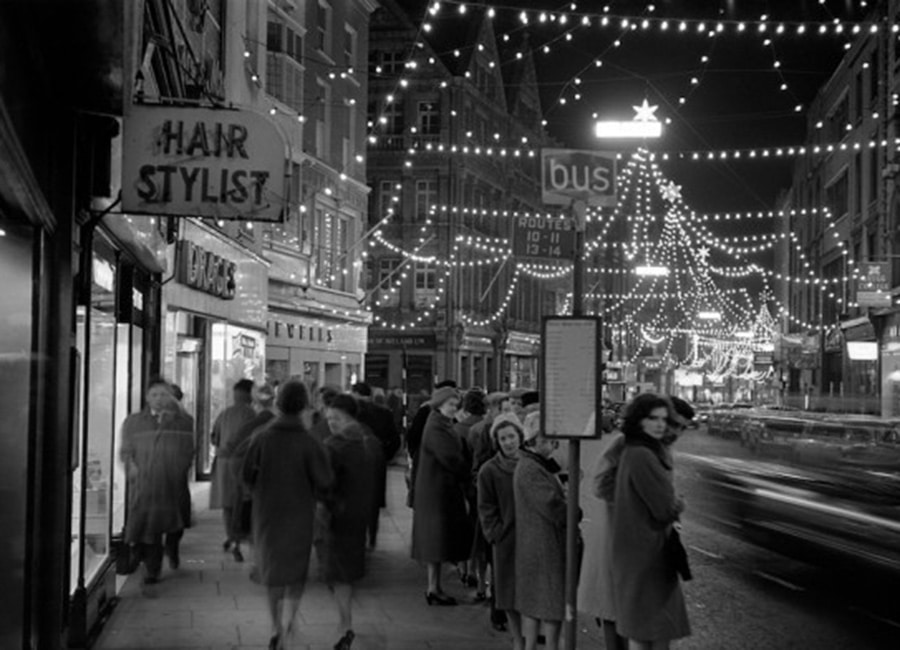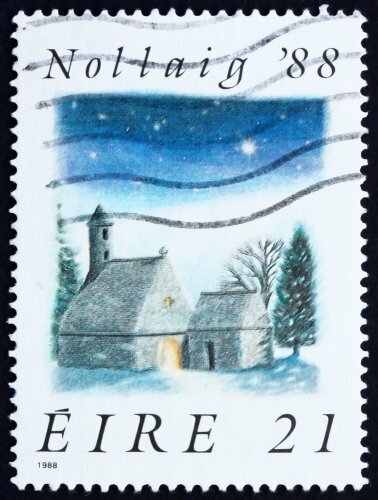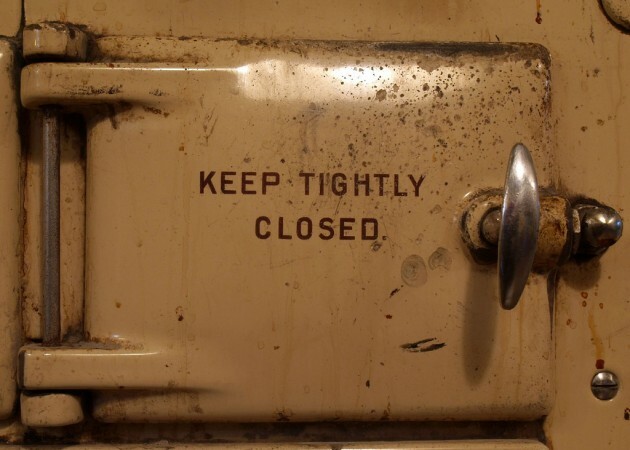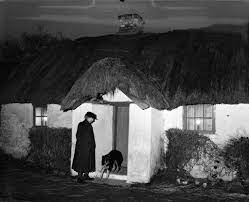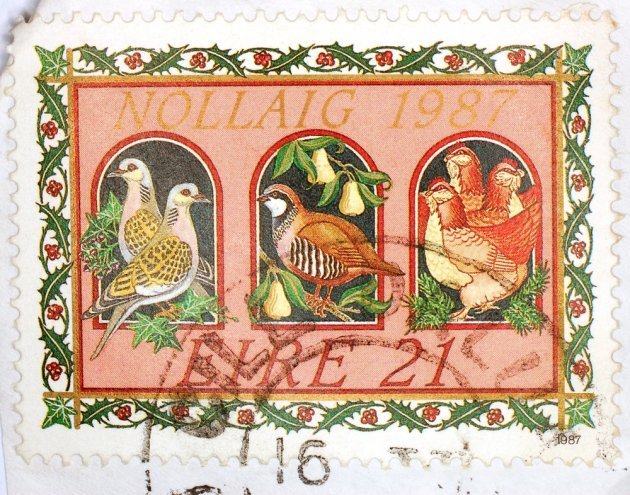If you cast your mind back to 2013, Golden Ireland in association with Liberties Press published ‘The Little Book of Christmas Memories.’ It was the culmination of two years of collecting stories from our lovely readers who entered a competition entitled “Memories of Christmas Past.” The stories were incorporated into a beautiful book with contributions from some of Ireland’s best-loved writers, including Roddy Doyle, Alice Taylor, Colum McCann, Sinéad Moriarty and John Boyne. Here we bring you a sample of some of the entries from our readers. Do any of these strike a chord with you?
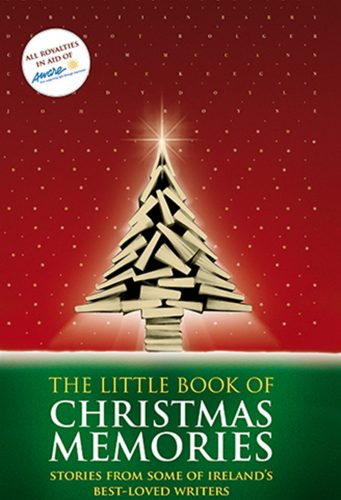
Dublin, 1960s – Liam Greene
GROWING UP IN the Dublin of the early sixties, one remembers the long warm summers, the endless games of football using your geansaí for goals, Taylor Keith Red Lemonade, Flash Bars, milk delivered in bottles and the magical glow of Christmas. It was a time of plenty, fragrant pine trees, smiles and Santa Claus. My younger sister Maura and I held Santa in the highest regard and always managed to rise early to investigate our stockings.
The preparation for Christmas began months earlier, with my mother greasing eggs and carefully wrapping them, storing them for the baking season. The making of puddings and cakes involved great pomp and ceremony, with all the precious and fragrant ingredients carefully measured out before mixing in a large bowl. Our treat was to lick the wooden spoon clean of the sweet, spicy yet creamy mixture.
On Christmas Eve we would make the much anticipated visit to town, where a visit to Santa Claus in Clery’s would be followed by a plate of chips in Woolworths in Henry Street. I can still taste those golden vinegary chips in that clattering cafeteria. Outside the traders sold ‘the last of the Cheeky Charlies’ as darkness fell and a thousand lights began to twinkle.
Once home the turkey then came in for special attention as it would arrive up from my uncle’s farm in Wicklow and be left hang from the back of the shed door. We would watch in amazement as my mother would prepare it for the oven, no oven-ready birds in those days! Then it was the task of the youngest to light the Christmas candle ‘to welcome strangers’ our mother explained. Then to bed and sleep which came slowly as the excitement mounted.
Christmas Day always followed the same routine. After church my father took us visiting to all our relatives where numerous bottles of orange were consumed. Then back home to a blazing fire and a late breakfast. This is where the story gets dirty! The chimney had not been swept that winter and caught fire covering the dining table and our breakfast in black smuts, only the black pudding seemed to escape! A minor panic ensued before order was restored and my little sister reassured that Santa did not get stuck up the chimney causing it to go on fire.
That evening a flurry of snowflakes fell and we had our white Christmas. I felt it was God’s way of cleaning up. That was Christmas 1962 and we were to have snow until March in what was called ‘the coldest Winter in living memory’. It will always remain in my memory, that’s for sure.
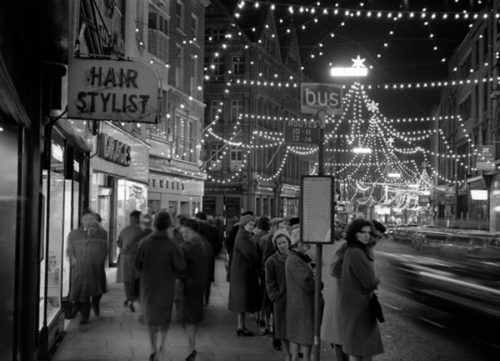
Antonia Hart, Dublin
Dublin, 6 o’clock, Christmas Eve. My mother packs four of us into the car, and drapes the dog over our knees. It’s a squeeze now we’re into our twenties. She’s bringing us to the dilapidated Wicklow farmhouse for which she and my father have exchanged their city centre life. We crawl along the Rock Road, shaking the worst of the traffic by the time we turn onto the dual carriageway. Through Glenealy and Rathdrum, the drive is a black and quiet one, interrupted occasionally by a flash of passing headlights.
I don’t know how to celebrate Christmas other than with pre-dawn pillowcases followed by morning Mass at the University Church in Stephen’s Green, and the aunts arriving for turkey and vodka and tonic, bringing unnecessary extra puddings and sweets. Christmas is about the deserted, Sunday feeling of the city; it’s not about a half-restored rural house.
The farmhouse has electricity in one room: it runs through a single temporary flex and power point into the kitchen. We plug in a four-way extension cable, and load as many appliances as we dare. Christmas is not about stepping into the pitch dark garden to go to the loo in a bush before bed because the bathroom is not yet properly plumbed.
An hour later we descend the rutted drive in first gear. I am ready with the big torch that takes a battery as thick as my thigh, and my brother jostles me out of the car into the freezing Wicklow night. I hear my father’s voice raised in greeting, and turn to the house for the first time. Yellow light spills from every window of this house I have never before seen lighted. Inside, my sister and father have placed tealights and candles on every windowsill and table. Two vast fires burn, and the smoke barely stings my eyes.
The dining table is spread with the same pale Italian tablecloth and napkins we’ve used every Christmas I can remember. It shines with familiar silver, and the crystal from which we are finally old enough to drink wine. It looks like some sort of medieval feast, and despite the looped orange cord of the Black and Decker drill on the sideboard and the planks of wood leaning against the wall, it is by a distance the prettiest start to Christmas I have ever had.
“Thank God we don’t have electricity,” my father says, when he’s filled the glasses. Despite the fires, it’s so cold in the house we have kept our overcoats on, and I push my scarf down from my face to take a sip. “Spoil the effect entirely.”
“You might feel differently tomorrow,” my mother says. “Christmas lunch isn’t going to appear out of nowhere.”
“Quite right,” he says, “it isn’t. It’s going to appear from the Woodenbridge Hotel.”
The prepared turkey goes to the hotel on Christmas morning. When the chef telephones a couple of hours later, we start the vegetables on the portable two-ring electric hob we’ve borrowed from someone’s bedsit, and they are ready when my brothers carry in the hotel-cooked turkey, a golden 18-pounder. My father says it has taken all the trouble out of Christmas lunch.
Later, we peer at the Trivial Pursuit dice, trying to make out the numbers by candlelight. No one has the heart to tell my father that the chef has said this is the last year the hotel will be open at Christmas. I suppose we may have an oven by next year, though given the choice of lavatory or oven, I’ll take a lavatory every time.
Dublin, 1945 – Catherine Leon
CHRISTMAS TIME WAS always a joyous occasion in our house. A family of ten children, five boys and five girls. I was the youngest. We all got jobs to do to help out for the festive season.
In our kitchen we had a black range and it was my job to clean out the ashes and polish it with a dye to make it shiny. The year was 1945. Everything centred on this range, from the heating to the cooking and boiling the huge black iron kettle for instant hot water for tea, or washing ourselves in the big tub and enjoying the comfort of the heat of the fire when we got dried.
Our cat called Penny would sit on it until it got so hot she had to jump down. Normally just before Christmas, Mam would order a half ton of English coal from Ted Castles Coal
Merchants so that the range was ready for the big day. The big turkey fitted in the oven, the boiling of the pudding, and there was enough room for the vegetables on top.
We lived on the north side of Dublin and Da worked as a lorry driver for the British & Irish Steam Packing Co., North Wall. The day before Christmas Eve Ted Castles came with our delivery of coal. Mam was delighted and stacked into the range as much as it could hold; it was glowing and hot when my Da came home from work. It was his payday and the money was always sorted out in the kitchen. He had his money in a brown packet, which every worker got at that time. He started to open his packet and sort out his wages to give Mam her share, having money in one hand and the empty packet in the other.
Suddenly by mistake, Dad lifted the cover of the range and threw his wages into the fire and was left with the brown packet in his hand. My Father and Mother went into shock, as the family stood and looked at the fire while the money went into a smouldering black tissue. Not a word was spoken by any of us except by my Da, he walked up and down in our hallway for over an hour calling Jesus’s name every few minutes.
My Mam didn’t say a word in anger or criticise him for his error in any way. We were stunted into silence that day and never mentioned it to him in the years that followed.
That Christmas Day was not the same for us, because everyone was afraid to say anything about the money and the loss of our Da’s wages, we never found out how much was in the packet.
I know it was his weeks wages and maybe a double or bonus for that time of the year. There are only three of us left alive.
To this day I can see the look of horror on my parents face looking at the money going up in smoke. We had many more wonderful Christmas Days together as a big family.
West Cork, 1940s – Phil Young
CHRISTMAS IN THE 1940s did not truly begin until about a week before the big event. It was then that the shop windows would be transformed into magical scenes. Exotic fruits, iced cakes,boxes of chocolates bound with red ribbons . . . these took over from the usual prosaic fare in our grocery store. The chemist’s window became like a scene from a Hollywood movie, and the general hardware store replaced the spades and fertilisers in its window with children’s toys, brightly coloured tricycles, prams with gorgeous looking china dolls in residence, and handmade dolls houses – toys which we well knew Santa would never bring to us.
We duly wrote our Santa letters, placed them carefully on the chimney breast, from where Santa’s elves collected them in the dead of night. A trip to the local library to stock up on our Christmas reading was next on our list. Then off to the newsagent to collect the bumper version of Ireland’s Own, and of course the Cork Holly Bough, without which Christmas would never be the same.
Christmas eve saw the return of those members of the family who had left our small West Cork town to find work or to study in Cork city. We waited anxiously at the bus stop, and yes, here they were, laden with parcels and mysterious looking packages. Now Christmas could really begin.
Logs stacked into the fireplace, sparks flying up the chimney, holly festooned on every picture rail, a big red candle in the centre of the table, and another candle in the window, to show a welcome for the Holy Family. The Christmas cake would be cut, and small family gifts handed around. Then it was early to bed for us children, with flutters in our tummies at the thought of that special visitor who would come to us in the middle of the
night – but only if we were fast asleep.
Long before dawn the whispers and the rustlings would begin. Yes – Santa had arrived, and look! All we had put in our letters had been delivered. Our stockings bulged with card
games, trinkets of all sorts, sweets and of course an orange. Our big present lay wrapped beneath the bed, and it always lived up to expectations.
Early morning Mass, neighbours greeting one another, clatter of footsteps on frosty ground. The church warm and dimly lit, with the star atop the crib providing the brightest light. After Mass, back to the sizzle of rashers and eggs and mugs of hot tea.
Turkey in the oven, plum pudding simmering away, adults shooing us children from under their feet. All busy, busy, busy.
Finally, we are all seated, table weighed down with food, and each person wearing a silly hat and having a cracker to pull. My father recites a beautiful Irish prayer, and then the feast begins. Afterwards we slump before the fire, read, play cards, tell stories,
and even have the odd argument! Darkness creeps around the house, the fire hisses and crackles, the adults doze, and we children are finally sent to bed.
Tomorrow beckons. We will dress up in tattered clothes, carry a holly branch over our shoulder, and sing the Wren from door to door. Then, with the proceeds of our collection, it will be off to the cinema, to meet up with our school friends, eat lots of sweets, and watch whatever film happens to be showing. The end of a perfect Christmas!
Bridget Smyth, Scotstown, Co Monaghan
I grew up in a very isolated country area. There was no electricity, running water, telephones or motorcars. The pedal bicycle was the fastest form of transport, and even then it was only the better-off people who owned one. There was no such thing as children’s bicycles.
Christmas was the only feast that was celebrated then, and even it was very low-key compared to the festivities we have today. Preparations began at least six weeks before Christmas. The first job was to clean the chimney. This was done by pulling a holly bush up and down the chimney, which created a lot of dusty soot all over the place. The cleaning up then began. The kitchen table, four legged stools and wooden form were taken out and scrubbed white. As there were no detergents then, sandstone was ground down into a powder. The scrubbing brush was homemade from the remains of a heather bissom, which was no longer suitable for sweeping the floor.
Next, the walls and floor of the kitchen were washed down, and a coat of whitewash was applied to the kitchen walls. Then the decorations were put up. These consisted mainly of berried holly interspersed with local wildflowers, and (if available), small dots of cotton wool.
Most farm families reared turkeys, but could not afford to kill one for themselves, as they needed the money to pay bills such as rent and rates. Some people who reared geese used one for Christmas. Not every family reared geese – my mother would buy a pound of meat.
There wasn’t much emphasis on Santa Claus in those days. Of course, we were aware of such person, and we were told that if we were good, he would visit us on Christmas Eve. He must have been poor then also, because the presents were small and inexpensive. They were mostly a couple of pencils or an item of clothing. Still, we were always looking forward to his arrival. We had to hang our stockings on the crook before going to bed on Christmas Eve. The stockings would mostly have been hand-knit, and as all the boys wore short trousers, which reached to just above the knee, the stockings would not hold a lot. It was very important to have enough turf stored to cover at least two or three days.
In each locality there were men who made potín for Christmas. Again, this chore had to begin at least six weeks before Christmas. A four-stone bag of sugar was purchased which had to be stepped. A forty-five gallon wooden barrel filled with water, into which the sugar and an amount of yeast and oaten meal were added. The barrel was then buried in a bog bank until the mixture fermented. It was then distilled. The whole process was very secretive, and of course illegal. In a lot of areas, this would have been the only alcohol available to country people.
There was more emphasis on the religious aspect of the feast day in those times. Special confessions were held a few days before Christmas Day. On Christmas morning, there were three consecutive Masses offered up. These Masses began at 6 or 7am. It would be pitch dark that morning, but people would light candles in the windows of their houses. This added to the atmosphere and excitement of the day. The children would be telling each other what they got from Santa. The local flute band would parade to the local mass. They carried Tilley lamps on poles, and it was a magical scene to behold them moving through the darkness playing their music. These are some of my memories of Christmas in the 1940s.
For more, see The Little Book of Christmas Memories
